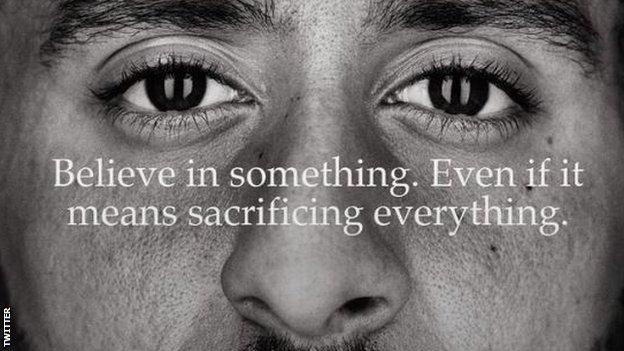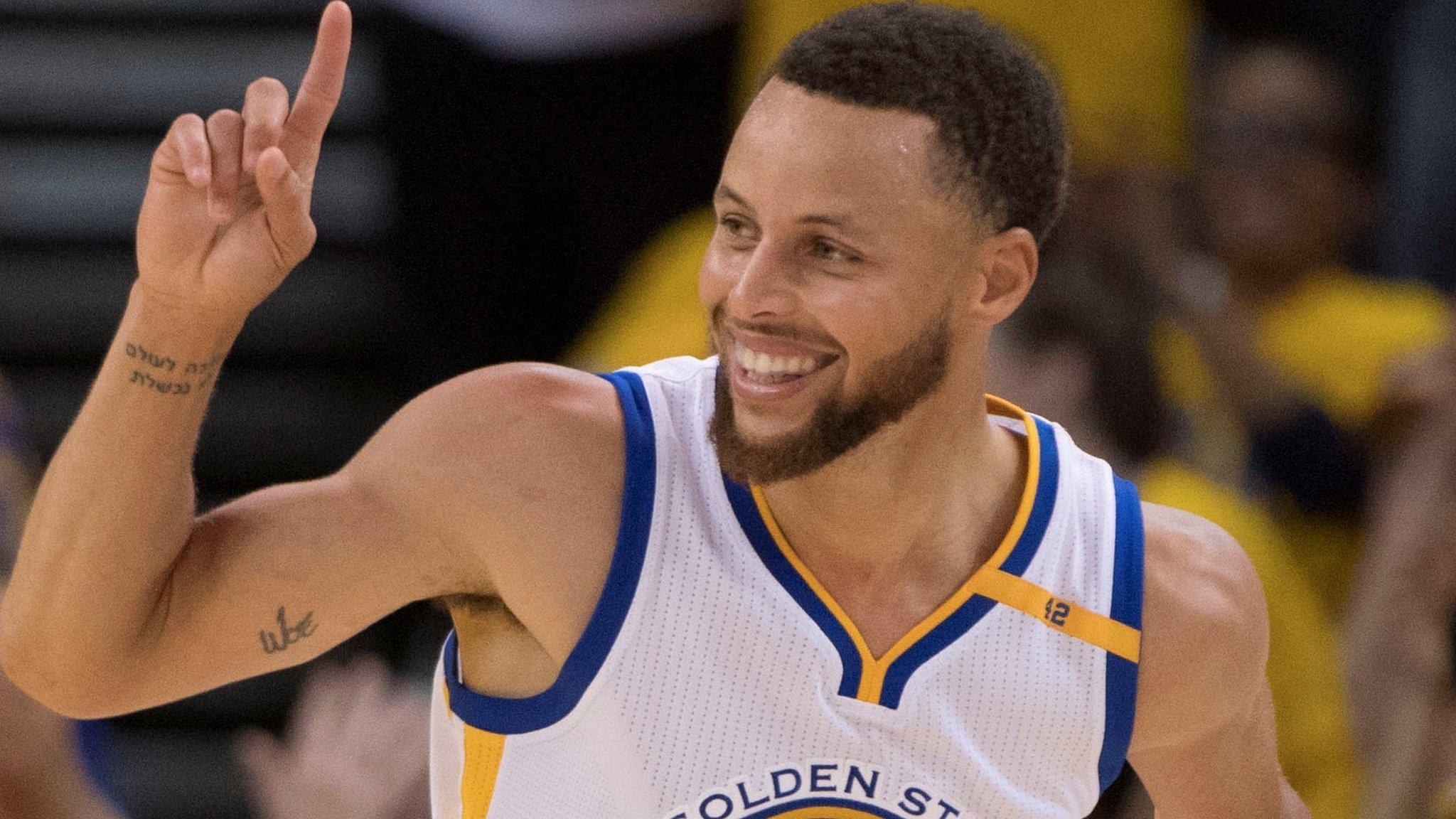NBA star Steph Curry at heart of new era of US athlete activism
- Published
Influential athletes can speak for those who can't - Curry
Even in an era of renewed athlete activism in US sports, the voice of Steph Curry is among the most important.
Having twice been voted the NBA's Most Valuable Player, the 30-year-old basketball superstar is the driving force behind a Golden State Warriors franchise that have come to dominate the league, the reigning champions winning the title three times in the last four seasons.
With a reputation as one of the finest shooters in NBA history, Curry is at the peak of his powers. But rather than play it safe and keep out of politics, quietly enjoying his vast fortune (he recently signed the biggest contract in NBA history worth more than $200m) Curry wants to use his fame to make a difference on social issues.
Speaking at a grassroots court just off Brick Lane in London's East End, where he held a coaching session for the star-struck young members of a local basketball club during the final leg of a worldwide promotional tour, Curry told me having an opinion was now a responsibility for top athletes, rather than a burden.
"It comes with the territory, because the world is small now" he says.
"If I say something, I can tweet it out and the whole world can read it. You can own that, more so than generations of the past where maybe you had to go through different channels. So there's more eyeballs and ears around what we have to say, and we have an opportunity and a platform to speak for those who can't speak for themselves."
A quick glance at Curry's twitter account shows you what he means, the most recent post to his 12 million followers a message to the people of his home state of North Carolina to "stay safe" in the face of Hurricane Florence.
"Things that are important to us, we want to talk about, and I think there's definitely a wave of athletes and influencers who aren't afraid of the potential consequences of being disagreed with," he says.
Last month the father-of-three wrote an impassioned essay entitled 'This Is Personal', external about women's equality and inclusion, making clear his determination to "close the opportunity and pay gap", explaining how his two daughters meant he was "feeling more driven than ever to help out women who are working toward progress".
At a time when Serena Williams' extraordinary row with umpire Carlos Ramos in the US Open final last weekend sparked renewed debate around her claims of sexism in sport, and when sports organisations have come under renewed scrutiny over gender and pay inequality, Curry's remarks carried weight.
Archive: Steph Curry's best moments
"I think on the court, we all have reactions to things that happen," Curry says when I ask what he made of Williams' controversial comments following her defeat at Flushing Meadows.
"I've thrown mouthpieces before, I've had outbursts which you may want to take back afterwards, but the way that she handled it post-match with how eloquently she put her sentiments around gender equality and her sport, she created that conversation that we all can assess for ourselves.
"And whether you agree with her or not... there were issues that Serena wanted to deal with and those conversations are going to keep going because of how she took a stand."
But Curry is no stranger to taking a stand himself. Last year the US President Donald Trump cancelled an invite for the Warriors to visit the White House to celebrate winning the championship after Curry said he would snub the offer to "inspire some change… and send a statement that hopefully encourages unity".
"Stephen Curry is hesitating, therefore invitation is withdrawn!" tweeted Trump in response.
"Obviously with the visit to the White House and things like that I said how I felt, and I tried to provide reasons why I felt those ways, and obviously I'm not going to waver," he says.
"You're not going to please everyone in this world, but it's all about spreading love and respect, especially us athletes in the NBA who've done it to a high level."
Maybe Curry has been influenced by the Warriors' head coach Steve Kerr, who has spoken out about everything from Trump's immigration policies to gun control, and is even considered by many - alongside his San Antonio Spurs counterpart Gregg Popovich - as a potential presidential candidate one day.
Curry and the Warriors do not stand alone in sport when it comes to being uninvited from the White House. Earlier this year the NFL's Philadelphia Eagles were told they were no longer welcome there either after it became apparent that only a small delegation from the team were prepared to attend a ceremony marking their Super Bowl triumph, an act of defiance described as a "political stunt" by Trump's spokeswoman.
The US President has been critical of the league for allowing players to kneel during the traditional pre-match national anthem in a protest against police brutality toward African-Americans.
This summer, NFL owners succumbed to the pressure and approved a policy that would fine players who continued the practice. However, the league later put that policy on hold, and no such penalties were implemented for the start of the season.
If that dismayed Trump, so too did the decision of another sports kit manufacturer, Nike, to use Colin Kaepernick - the first NFL player to 'take a knee' - as the face of their new advertising campaign. The former San Francisco 49ers quarterback has filed a lawsuit against NFL owners who he accuses of conspiring to keep him off team rosters for the past two years, and he has Curry's backing.
"I've talked to Colin plenty of times and supported a couple of causes he's been a part of, and I know he understands the risk that he took when he made that stand," explains Curry. "And at the end of the day, he's done so much good in terms of helping communities that need help, raising awareness for people that need help, I think that's all right.
"He wanted to shine a light on racial inequality and police brutality, and that's what the NFL players have stood for, and I definitely respect them.
"I understand it's all about empowering voices, and making sure that what people are speaking on is not taken away from them because of a misunderstanding of how the whole thing started in terms of not disrespecting the flag by taking a knee."
Maybe, as Curry believes, a combination of the unprecedented popularity of certain athletes, and the social-media age making it simpler to communicate how they believe, has amplified their impact. Perhaps the policies of the Trump administration means 'sticking to sport' and staying silent, is no longer seen as an option.

Nike's new advertising campaign, which features Colin Kaepernick, celebrates the 30th anniversary of its 'Just Do It' slogan
Of the players in the NFL, 70% are African-American. In the NBA that proportion is 75%. And this current generation of sports stars have grown up at a time when the US has been forced to confront some uncomfortable truths about racial injustice. And yet some US sports stars handle politics rather differently.
Last month, for example, at a press conference following the Northern Trust PGA golf tournament, Tiger Woods refused to be drawn on Trump's immigration policies, responding to a reporter's question about race relations by answering: "No, I just finished 72 holes and I'm really hungry."
Basketball legend Michael Jordan is another who has been notoriously reticent about commenting on political issues, criticised during his playing days in the 1990s for declining to support a black Democratic Senate candidate in his home state of North Carolina.
Jordan and Woods will be all too aware that for athletes, straying from diplomatic neutrality can have a polarising effect, alienating fans, the customers of sponsors, and sections of the media. The Nike customers who burned their socks and cut the 'swoosh' logo out of their kit after their first airing of the new Kaepernick ad proves that.
So too did Fox News host Laura Ingraham earlier this year, when she told NBA's biggest name of all, LeBron James, to "keep the political commentary to yourself… shut up and dribble" after he spoke out about police violence, the racism he had experienced, and even called Trump "a bum".
In 2016, James urged other professional athletes to honour the memory of American sport's most outspoken icon, Muhammad Ali, telling them to "do his legacy justice... educate ourselves, explore these issues… go back to our communities, help strengthen them. We all have to do better."
Since then Steph Curry may have emerged as LeBron James' fiercest rival, but when it comes to speaking up and using their extraordinary influence, they seem to be cut from the same cloth.
- Published14 September 2018
